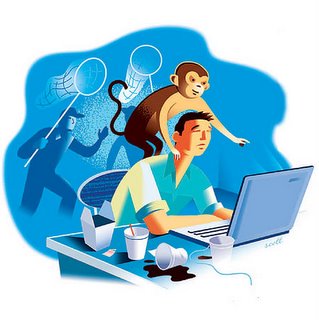 My Name Is David, And I'm A Webaholic
My Name Is David, And I'm A Webaholic
An interesting blurb in the NY Times. The crux:
specialists estimate that 6 percent to 10 percent of the approximately 189 million Internet users in this country have a dependency that can be as destructive as alcoholism and drug addiction, and they are rushing to treat it. Yet some in the field remain skeptical that heavy use of the Internet qualifies as a legitimate addiction, and one academic expert called it a fad illness.
Skeptics argue that even obsessive Internet use does not exact the same toll on health or family life as conventionally recognized addictions. But, mental health professionals who support the diagnosis of Internet addiction say, a majority of obsessive users are online to further addictions to gambling or pornography or have become much more dependent on those vices because of their prevalence on the Internet.
Now, I have been sucked into the Internet on occasion for 12-18 hours, but I wonder... For me the Internet is my replacement for TV, since I don't watch TV. Does that make me an addict? I can see where this can happen, though.
More:
On a list of 15 symptoms of Internet addiction used for diagnosis by Internet/Computer Addiction Services, Mike, who is unemployed and living with his mother, checked off 13, including intense cravings for the computer, lying about how much time he spends online, withdrawing from hobbies and social interactions, back pain and weight gain.
A growing number of therapists and inpatient rehabilitation centers are often treating Web addicts with the same approaches, including 12-step programs, used to treat chemical addictions.
Because the condition is not recognized in psychiatry as a disorder, insurance companies do not reimburse for treatment. So patients either pay out of pocket, or therapists and treatment centers bill for other afflictions, including the nonspecific impulse control disorder.
There is at least one inpatient program, at Proctor Hospital in Peoria, Ill., which admits patients to recover from obsessive computer use. Experts there said they see similar signs of withdrawal in those patients as in alcoholics or drug addicts, including profuse sweating, severe anxiety and paranoid symptoms.
And the prevalence of other technologies - like BlackBerry wireless e-mail devices, sometimes called CrackBerries because they are considered so addictive; the Treo cellphone-organizer ; and text messaging - has created a more generalized technology addiction, said Rick Zehr, the vice president of addiction and behavioral services at Proctor Hospital.
...
Among the programs offered by the Center for Online Addiction in Bradford, Pa., founded in 1994 by Dr. Kimberly S. Young, a leading researcher in Internet addiction, are cyberwidow support groups for the spouses of those having online affairs, treatment for addiction to eBay and intense behavioral counseling - in person, by telephone and online - to help clients get Web sober.
...
Dr. Orzack said she got the idea after she discovered she had become addicted to computer solitaire, procrastinating and losing sleep and time with her family.
When she started the clinic, she saw two patients a week at most. Now she sees dozens and receives five or six calls daily from those seeking treatment elsewhere in the country. More and more of those calls, she said, are coming from people concerned about family members addicted to Internet video games like EverQuest, Doom 3 and World of Warcraft.
It was Professor Kiesler who called Internet addiction a fad illness. In her view, she said, television addiction is worse.
Ha! I KNEW IT!
KILL YOUR TELEVISION!








